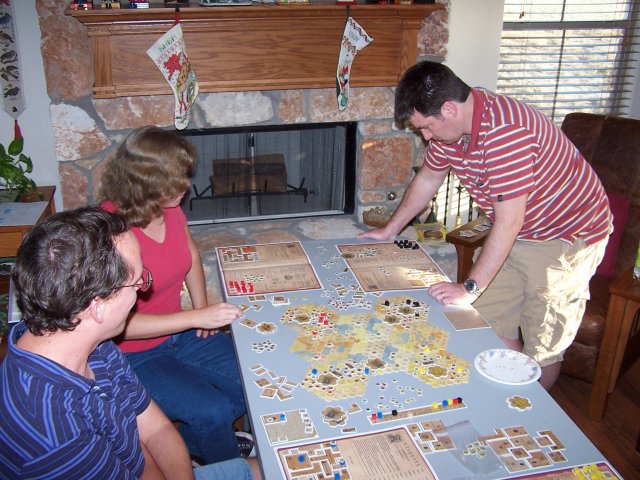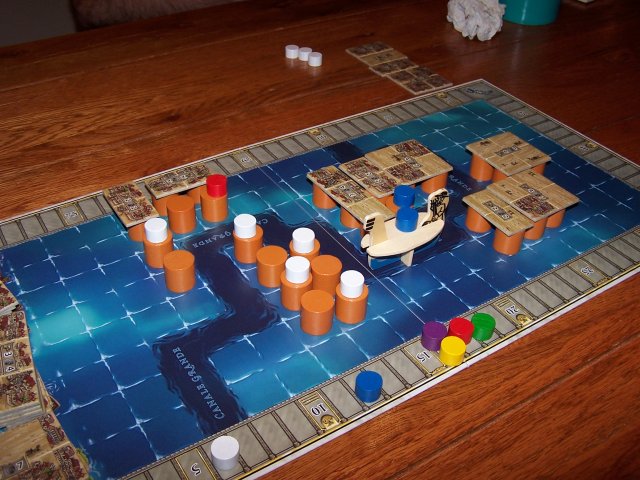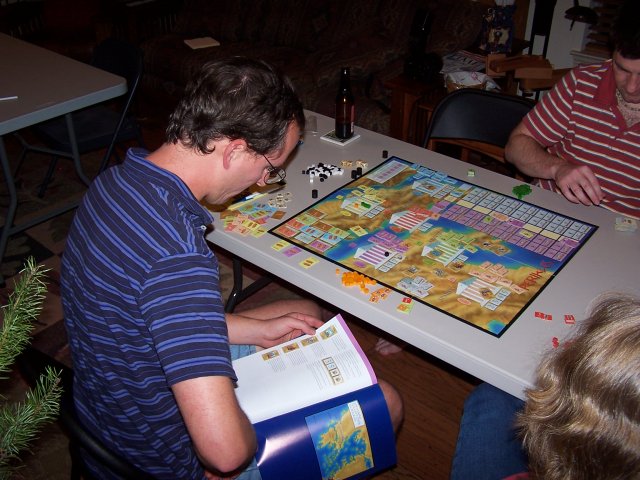
January 30, 20072007 Gaming Resolutionsby Susan Rozmiarek
1. I listed 17 unplayed games on our shelves that I wanted to play but I only managed to knock off 6 of them. Not so good, but I did make a decent effort. Time constraints and my group's fondness for the endless new and shiny games were the main factors in my failure to get these to the table. 2. We did hold a neighborhood game night earlier in the year that was a big success. Everyone showed a lot of enthusiasm to do it again but we found it hard to find a night that worked for everyone. Kiddie sport practices are the main barrier it seems and oh, do we understand completely! My motivation to persist kind of died after John from our regular gaming group started a monthly Meetup game group a mere 15 miles away. (Yes, this a short distance for those of us who live in the sticks!) This group may go to twice a month and is on the one day of the week that is consistently available for us. My desire for starting a closer group was entirely selfish. I wasn't trying to evangelize; I just wanted to play more often. Okay, enough of the past and on to the future. My 2007 Gaming Resolutions 1. I have a printed list of about 80 unplayed games that we own. My plan is to try to play at least three of these games every month. This won't get to nearly all of them by year's end, of course, but some are not even ones that I want to play. These are ones that Ed likes, or are 3rd and 4th prize table picks from conventions and such. I'll be doing a little session report on these games at the end of each month. 2. This one involves curtailing game purchases. While I admire the Iron Gamers, I really think this is too strict for us. Our main problem is that we get most of our games online with a credit card which makes it way too easy for orders to get out of hand. We'll just pay it off later, right? We try to cut back too much and deprive ourselves, but if we go without too long we have a weak moment and go REALLY crazy. So, we are going to try small monthly orders this year. Small, because we'll be paying with a debit card instead of credit. If the money isn't in our account, we can't get it. This will help us cut down in other areas as well. Dinner out? That's the same cost as a game! 3. And now we get to our storage problem. Even with all our bookcases, stacks of games are still sprouting up on the floor of our bedroom like weeds. Yes, we could do without so many, but we aren't ready to trim our collection enough to solve the problem. We like our games. A lot. I'm not totally sure what we are going to do, but I want a solution by the end of the year. It might involve a large shelving purchase (with cash, more saving to do) from our new IKEA store. Whew, that's it. These are the same old, boring resolutions that all gamers make about buying too many games and not playing them but I needed to get them in writing. Now, does anybody have any weight loss tips? :-)
Posted by susanroz at 5:36 PM
| Comments (5)
Review of Leonardo da Vinci postedby Susan Rozmiarek
I am going against popular opinion on this game. I really wanted to like it but it fell short for the reasons I describe in the review. A lot of people will probably like the game for some of the very reasons that I didn't.
Posted by susanroz at 12:03 PM
| Comments (0)
January 16, 2007Game Day Report for January 13, 2007by Susan Rozmiarek
Saturday we had a large turnout with a couple of new folks and an out-of-towner that we only knew previously online. It's always nice to put a face to a familiar BGG avatar. For a warm-up while waiting for others to arrive, I suffered through a game of Call My Bluff. I didn't mind playing so much this time as I managed to stay in at least half of the game for a change. Struggle for RomeHappy, happy! The UPS guy delivered a shiny, new English version of this the newest Catan game on Friday, just in time for today's gaming. While I consider the original Settlers of Catan to be a good game, it can't hold a candle to some of the historical versions. For some reason, extra chrome goes a long way with me when it comes to Settlers. Struggle for Rome is second in a series that began with Settlers of the Stone Age, another excellent game. Upon opening the box, I was "wowed" by plastic minis and a huge map of the Western Roman Empire that is the same size as that of Stone Age. However, I was disappointed in the thinner cardstock and player aids on paper instead of the thick cardstock like those in Stone Age. The map shows some of the familiar terrain hexes with numbers, however this time forests do not produce. So, to the disappointment of some gamers, there will be no "wood for sheep" jokes in this game. Rather than sheep, the pastures produce cattle or horses (drawn randomly) and mountains still produce ore. Fields produce wheat. The final resource in the game is money, which is represented by neat plastic coins molded (presumably) like real Roman coins. The game has a Roman Legionnaire that acts like the robber in Settlers except that there is no resource card hand limit. Like Settlers, there is a deck of development cards with special abilities, straight victory points and Diplomats which are played like the Army cards with a victory point bonus card for the player who has the most. Despite the similarities to the original game, Struggle plays quite differently. At the corners of many of the hexes across the board are cities. Each city starts with a face down plunder token. The back of each token is one of five colors and these colors divide the board into five different regions. Unlike Settlers, the beginning of the game is far from fixed. Instead of placing two settlements, players have two tokens, a Horseman, and a Warrior. These are placed on predetermined starting locations in a corner of the board just outside the Roman border. They represent two invading tribes that each player controls. Players have boxes on the board which contain the actual number of troops and supply wagons in each tribe. More troops and supply wagons are the two things you'll be "building" during the game. During a turn, players will be wandering around the map, plundering cities and eventually conquering them. The farther they move in a turn, the more it will cost and there are both land and sea routes. Cities have a certain number of towers and players must have at least that many troops in their tribe to plunder or conquer them. When they plunder a city, they take the facedown token. On the back, it shows bounty they receive which could be money (often based on how many supply wagons the tribe has), resource cards or a development card. Often there is a cost in troops and the player must discard a troop. Players cannot conquer a city until that tribe has collected plunder tokens of at least three regions. When they conquer a city, they must place the wandering tribe figure in the city along with a supply wagon for the tribe's box. The tribe is now fixed and doesn't wander any more. Instead, it spreads out by conquering neighboring cities. Conquered cities are like the settlements in Settlers and are worth one victory point each. What's neat is that there is a two point victory point bonus for any tribe that collects plunder tokens from all five regions. So, you'll have to decide between keeping your tribe wandering and plundering or settling down and conquering to grab the best locations. Some interesting innovations have been added to the way a game round works. The starting player rolls the resource dice until he gets four unique rolls. Everyone gets resources for the hexes rolled if they have a tribe there (wandering or conquered city). Now, in turn order, players trade and build, then (again in turn order) do Horseman tribe actions (moving and/or plundering or conquering) and finally Warrior tribe actions. The starting player passes to the left and then it's lather, rinse, and repeat. One nice aspect is the fact that a player can skip a tribe action and take a resource of their choice or two gold coins. This, the fact that the four resource rolls must be unique, and being able to pay three gold coins in place of a single resource when building mitigate the luck of the resource rolls some, a huge annoyance in the original Settlers. Nick pursued a strategy of quickly getting both his tribes settled in conquered cities. He won by conquering four cities with each of his two tribes. This got him a bonus card worth two victory points giving him ten to win the game. I was close behind with nine points. I settled one of my tribes quickly but left my Horseman tribe wandering and was able to pick up the bonus two points for plundering in each of the five areas. However, being the last tribe to settle down meant all the good locations had been taken. I also spent resources buying development cards and was able to hold on to the two point Diplomat card as well as a secret victory point. I was so close! Helen pursued a similar strategy to Nick but got hemmed in with limited cities close enough to conquer. Our game took a little longer than I think it should normally. There were a few difficulties trying to calculate movement costs at first. Update: I played another three player game with my family before posting this. We played in a reasonable two hours and it ended in a nail-biting, photo finish. Scores were 11-11-10 with the tiebreaker only two gold coins. I'm seeing several possible strategies to pursue and starting to recognize the best board locations. I'm really looking forward to playing it again, hopefully with four players. It was tense and a lot of fun. While waiting for other games to finish up, we squeezed a game of the ultra-light Trendy, which can practically be played on auto pilot now. I swear our poor copy is going to disintegrate someday from overuse. To Court the KingI do enjoy dice games but I was leery of all the special cards. This game has been aptly described as "yahtzee on steroids." You roll dice and try to get particular combinations to win different character cards. Each character card you win has a special power that you can use once on your turn. These powers are all different but fall into two general categories. They either give you more dice to roll or they can change your rolls in some way. You start out with just three dice and you slowly build, gaining more and more characters. The game ends when somebody wins the King and Queen at which time everyone takes a final turn. The winner is the one who rolls the most of a number (higher number breaking ties). So, you want to maximize the number of dice you can roll and have lots of ways to manipulate the dice. It was fun, especially as the game went on and you had to puzzle over many different abilities to manipulate. Becoming familiar with all the characters wasn't as hard as I had feared, especially with the help of the nice player aids provided. With five players though, there was way too much downtime. 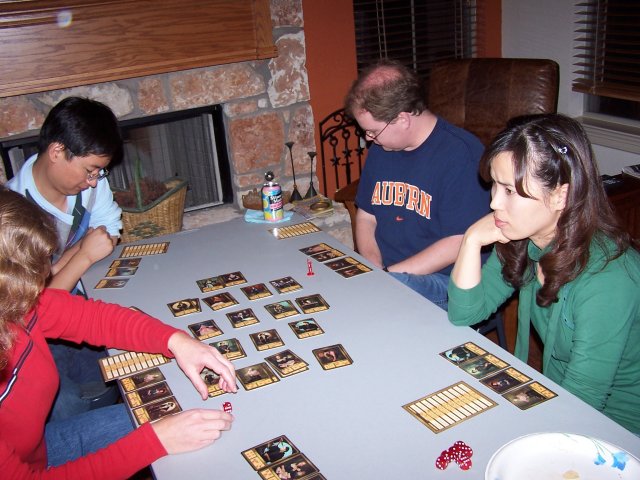 Susan, Peter, Clay, Francesca, and Helen (not pictured) play To Court the King. Francesca is giving Susan an evil look! Factory FunI was quite happy to teach this to three new players so I could play it again myself. Unfortunately, there seemed to be more frustration than fun and I don't think the others enjoyed it as much as I did. The biggest mistake everyone was making was grabbing a machine tile too quickly and not being able to place it, incurring a stiff penalty. This seems to be one of those games that polarizes people in to lovers and haters.
Betrayal at House on the HillI wouldn't dare suggest this game to some of our regulars. They used to occasionally play games like this but have now gravitated toward what they refer to as "meaty" games. Betrayal is one of those dice-rolling "fluffy" games that they tend to sneer at now, unfortunately. Despite many holes in the rules, this is fun "experience" game and I like to play one of those every now and then. So when new guy Nick suggested it I was quite surprised but pleased. This is the reason I like a fairly large gaming group. With a dozen people, you can get three different tables going and accommodate a wide variety of tastes. Warning: Spoilers ahead. Betrayal is more fun if you are unfamiliar with the scenarios and I'm about to describe one. Flash Williams, Heather Granville, Madame Zostra, and Brandon Jaspers (I think) timidly entered the house and started exploring in separate directions. The speedy Flash was able to uncover many of the mysteries of the upper floors while Brandon uncovered some very helpful rooms on the ground floor, the library and the chapel. Madame Zostra fell down the coal chute into the basement but was fortunately able to eventually find and use the mystic elevator to escape, but not before losing a bit of sanity form the frightful experience. Heather had the worst of luck, injuring herself in a hazardous part of the house that included the storeroom. Then, on the upper floor, she got coated in graveyard dust that further depleted her strength. She made a valiant effort to reach the balcony to get rid of the dust, but died just short when the traitor was revealed to be Flash. An abyss to Hell started swallowing the house room-by-room starting in the basement with the help of the evil Flash, while Madame Zostra and Brandon desperately tried to perform exorcisms in particular rooms or while holding specific items. After Madame Z successful performed one in the basement pentagram room, she made a dash for it but was sucked into abyss. It was now all up to Brandon who was trying to reach the library to perform the last exorcism needed to save himself and stop the mayhem. Alas, he was pursued and harried by Flash. Being only a young boy, he was no match for the hulking Flash's superior strength and was brutally murdered short of his goal. Evil prevailed and the rest of the house collapsed in to the abyss! For more pictures from this gaming session and others, see our Gaming Picture Gallery.
Posted by susanroz at 3:34 PM
| Comments (6)
January 8, 2007Game Night Report for January 5, 2007by Susan Rozmiarek
On the UndergroundI definitely have to check out any new train games so I jumped at the chance to try this game. It plays on the map of the London's subway system and each player gets to develop two different rail lines. There are two basic ways to score points that are often at odds with each other. One is by connecting to certain places and the other is by having the passenger travel over your lines. Players get four actions on their turn which will mostly be used to add track to the ends of their lines but also to get tokens that allow lines to branch. At the end of each player turn, the passenger will move to one or two of the stations depicted on four upturned cards. The rules for movement are slightly difficult to grasp at first but it helps to think of the passenger as being lazy. He wants to walk and change lines as little as possible. Predicting his movement and building your lines for future movement is the most interesting thing about the game, I thought. I think Ticket to Ride: Märklin does the whole thing a bit better, but On the Underground may have just enough of a unique twist to make it getting. Factory FunAh, puzzle-y goodness that I got to play twice today, once at lunch and then again tonight. I knew that I wanted this game based on the description alone. Players are building their own individual factory with various machines. Each machine requires a certain input of goods and then produces a particular good. The goods are various colors of goo and you get starting reservoirs of each. Machines are of varying monetary value. The idea is to place the machines in the factory so that they work together in chains with the output of one going into the input of another. There is a very big spatial element here as you want to be as efficient as possible. Things can be rearranged and pipes can be utilized to help but it is costly. To make it even more challenging, machines tiles are acquired in a frenzied, grabbing free-for-all manner. In each round, players simultaneously flip over one tile apiece and then everyone tries to be the first to grab the one that they want. It is very costly to toss a tile that you can't place so you have to know what you need and be able to spot and grab it quickly. I not a big fan of speed games but here in a small dose it was fun. Very fun. Several times I grabbed a tile that I thought I wanted only to discover the inputs were orientated the wrong way for me to use it. Arghh! The game was quite enjoyable both times and of the rare type that I want to play again immediately to see if I can do better. We ended the evening with a quick game of Poison, which was a nice, light closer after the previous brain-burner. You can see a list of games played and a few pictures here.
Posted by susanroz at 4:41 PM
| Comments (0)
January 3, 2007Games Day Report for December 16, 2006by Susan Rozmiarek
AntiquityThis game has been played several times at my house and I've been avoiding it all costs. In fact, I've been ignoring all the raving and putting my fingers in my ears while chanting, "I'm not listening." Why? Because I knew I would love it and >$100 for a single game is just too painful. Besides, I have my beloved copy of Roads & Boats. Do I really need a similar game? Then I saw a "ding-n-dent" copy for a paltry $75 at GameSurplus. I caved. It was my birthday after all. Cha-ching! Happy birthday to me!Wow. Oh, WOW. Like Roads & Boats, this is my very favorite type of heavy game. Give me a set of building toys and send me off into a corner to play and see what I can do with them. Give me lots of puzzles and choices but leave me alone until I've made some progress. I loved choosing my winning conditions and then having to tailor my plan to meet them. I loved how I had to take time and resources away from my plan to manage the pollution and graves which were just relentless. I loved how the using up of land forced expansion and the eventual bumping up and competing for real estate with other players. Gush, gush, gush. I just loved this game. It IS similar to Roads & Boats but the planning in Antiquity is very different. Much of the focus in Roads & Boats is on planning an efficient transportation system. In Antiquity it seems to be on choosing what to build in your cities and then using them to effectively milk the surrounding landscape while expanding so as to never run out of resources. Excellent stuff, indeed. Will Antiquity be joining Roads & Boats on my list of Favorite Games of All Time? Time will tell. I do feel that I need to insert a warning here. Like R&B, Antiquity comes with a mountain of small chits that you'll be shuffling around every turn in a very fiddly fashion. It's long and it has a steep learning curve. It's pretty solitaire-ish and the player interaction is indirect. The box is huge and takes up a lot of shelf space. And of course, as I mentioned, it is quite pricey. All of these factors are definitely going to turn off a lot of folks. Die Säulen von VenedigAfter frying many brain cells with Antiquity, a lighter game was in order. We played this new Goldsieber game with a full complement of six players and it was rather fun. Like last year's Kreta from the same publisher, this game also has role cards that allow players to do different things when played. The game is about building the city of Venice. Wooden pillars are placed on the city board and then city building tiles are placed on top of those for victory points. Some pillars are marked as owned by players when they are built and can yield victory points for the owner when another player builds atop them. The cards do various things - add city tiles to your supply, build city tiles, build pillars, score bonus points if a certain card is played by another player, destroy a building, etc. The mechanism is rather neat. Players simultaneously and secretly choose a card from their hand. The cards are revealed and each player executes his action in turn order and then passes his played card to the player on his left who adds the card to his hand. So, you can get an idea of what other players might do based on what you know is in their hand. Another neat thing is that certain character cards have a symbol on them which indicates that at the end of the round, the first player marker will be passed to the person on that player's left to start the next round.Timing was everything once this game got going. Playing the Builder card when you are late in the turn order is futile as you were sure to get hosed and have no available pillars by the time your turn comes around. I actually found the Beggar to be quite useful when I was last in the turn order. The beggar allows you to copy any character played (except the Spy) and so he usually gives you some choices. The bonus cards are rather fun to play. If there are a lot of empty pillars on the board, you can be fairly sure that Builders will be played and this would be a great time to play, if you have it, the Speculator card for six points if a Builder has been played. You could also play the Beggar, to imitate the Speculator if it and the Builder are played. I did love that Beggar! At any rate, the game was fun and I found it to be a bit more than just random guessing as you have enough information to predict somewhat what other players might do. I'm curious how it plays with fewer players. I imagine players will have more control which could be good or bad depending on whether you want to make this a light game or not. PeriklesSo now we get to a game that I just didn't like. Mark really wanted to give this new Martin Wallace game a try and he persuaded Jon and me to play. Jon had played it before and wasn't too keen but was willing and I wanted to see if it was a possible purchase. Wallace has had some solid hits with us like Struggle/Conquest of Empires and Liberté, but to be honest, his games don't hit the table very often because of the length and long, sometimes fiddly rules that need to be closely read again every time. We still have Byzantium and Princes of the Renaissance sitting unplayed on our shelves. So despite the glowing reviews, I wasn't sure if we really needed Perikles. Well, now I know that we don't. Thank you, Mark, for saving us about $40. I'll warn you about my discussion that follows. I was taught the game and have neither read the rules nor do I have access to them. So, I might call things by the wrong name. It's also possible that we missed a rule or two (or three or four). Our group excels in that!First I'll mention the things that I did like. I thought the overall idea of the game was neat. Each round (year?) has two phases. First players fight to be elected to be the leader of each of 6 cities in ancient Greece. The leader of each city gets control of the military forces of that city in the following phase in which battles between cities are fought to win victory point tiles. If one doesn't get control of any of the cities, all is not lost. That player will get to control the powerful Persians. Also, at the end of the game each city will be worth victory points which go down during the game when the city loses a battle. Each time a player is the leader of the city, they have a statue built in their honor. Each of these statues is worth the city's points at the end of the game. So, there will be certain cities you'll want to see defeated or victorious regardless of the battle tile points. So far, so good, right? Well, the game goes very wrong for me when you actually delve into the individual phases. You win control of cities through area majority control. The problem is, both the number of cubes (1 or 2) and the particular city in which you play them are based on a randomly drawn set of tiles and this is not a good time in the game to get hurt by luck-of-the-draw. What you achieve in this phase drastically affects your success in the next and sometimes the tiles available to you leave nothing meaningful to do. There are some nice nuances with electing leaders, but not enough to overcome the limitations of the tile draws. This whole phase was a little bland, I thought. I disliked the second phase even more. This consists of blind bidding and bluffing battles using the forces you control by allocating your forces tiles facedown opposite a battle tile that depicts the city being defended. After everyone has placed all their tiles, they are revealed and each battle is resolved. Brace yourself because here is where things get really fiddly. There are two types of units - land and naval. For most of the tiles, there will be a battle fought for each unit type in the order designated on the battle tile. You count up the value on the attacker's tiles of that type and compare it to the summed value of the defender's and consult a chart to see what each player has to roll on the dice to be successful. So now each side starts rolling against each other. For each success, that player gets a black, chunky wooden...thing. Once a player gets two of those black things, he wins this battle. He gets to carry one of the black things into the second battle with the other unit type where this whole process is repeated. This second battle alone decides who actually wins the war and gets the battle tile and its victory points. That first battle was just to determine which player gets a black-thing advantage in the real battle. What does this all represent? I'm not sure. The whole process seems very abstract and fiddly to me. I was longing for the map and amassing armies in Struggle of Empires and better yet, the unwieldy plastic sculptures and enormous map of the Eagle Games version. At least you feel like you're in a battle. I've glossed over the rules a bit (Okay, a lot) but you get the general idea. Despite the high ratings this game is getting, it is definitely not for me although it does have some neat ideas. Since I enjoy other games with pasted on themes, I'm not sure why it bothered me so much here. Nothing in the game really hooked me. I guess that it just seemed too boring and too abstract for what I wanted it to be, another Wallace game with a rich thematic feel and some new clever mechanisms. When you look at the ratings for Perikles on BGG, I'm obviously in the minority so perhaps I'm missing something. As a parting shot, I'll also add that I didn't care for the pastel color theme at all. Blech. There, so much for Pollyanna. Don't worry; I'm sure she'll be back in the next report.
Posted by susanroz at 5:15 PM
| Comments (2)
This page viewed E-mail Ed Rozmiarek with questions or problems concerning this page. Copyright © 2007, Ed & Susan Rozmiarek. No portion of this website may be reproduced or copied without the consent of Ed or Susan Rozmiarek. |
 Yes, it's time to put in writing my gaming resolutions for the New Year, even if it is the last day of January. I know this is a rather dull subject for any blog readers, but I need to be able to reference this post during the year to remind myself of my goals and hold myself accountable.
Yes, it's time to put in writing my gaming resolutions for the New Year, even if it is the last day of January. I know this is a rather dull subject for any blog readers, but I need to be able to reference this post during the year to remind myself of my goals and hold myself accountable.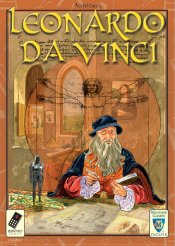 You can read the review
You can read the review  This was a great week of gaming for me as we not only hosted a game day, but also got to go to Mark's on Thursday night. At Mark's I got to try Augsburg 1520 but we got several important rules wrong. Still, I got enough of a taste to see that it has some interesting aspects to explore, enough that I might like it despite a horribly boring, drab theme. I also got schooled by two card sharks in Sticheln, an evil, tricky little card game that I'd only played a couple of times long ago.
This was a great week of gaming for me as we not only hosted a game day, but also got to go to Mark's on Thursday night. At Mark's I got to try Augsburg 1520 but we got several important rules wrong. Still, I got enough of a taste to see that it has some interesting aspects to explore, enough that I might like it despite a horribly boring, drab theme. I also got schooled by two card sharks in Sticheln, an evil, tricky little card game that I'd only played a couple of times long ago.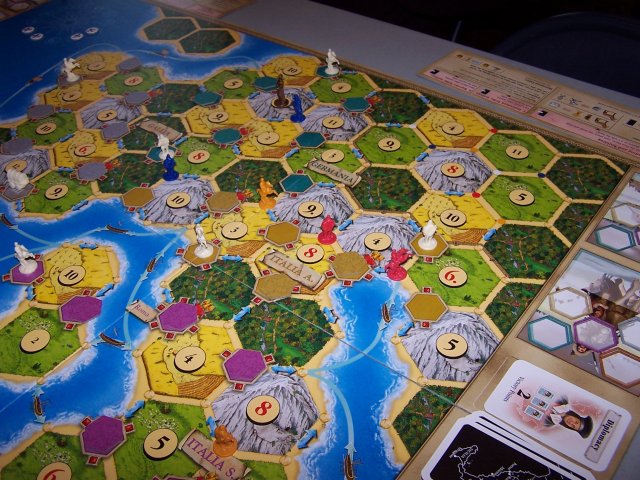
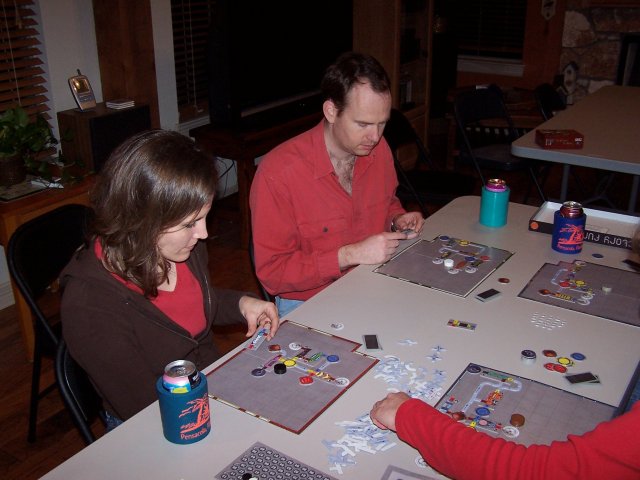
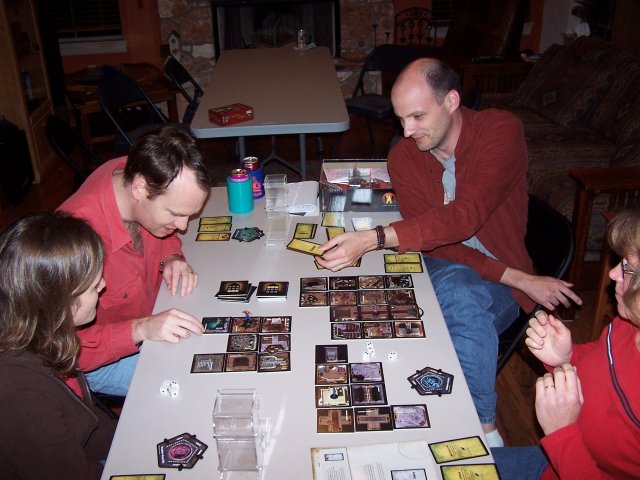
 Also, I hope that my selection of games played this day dispels any rumors that I have become a "fluffy" gamer!
Also, I hope that my selection of games played this day dispels any rumors that I have become a "fluffy" gamer!